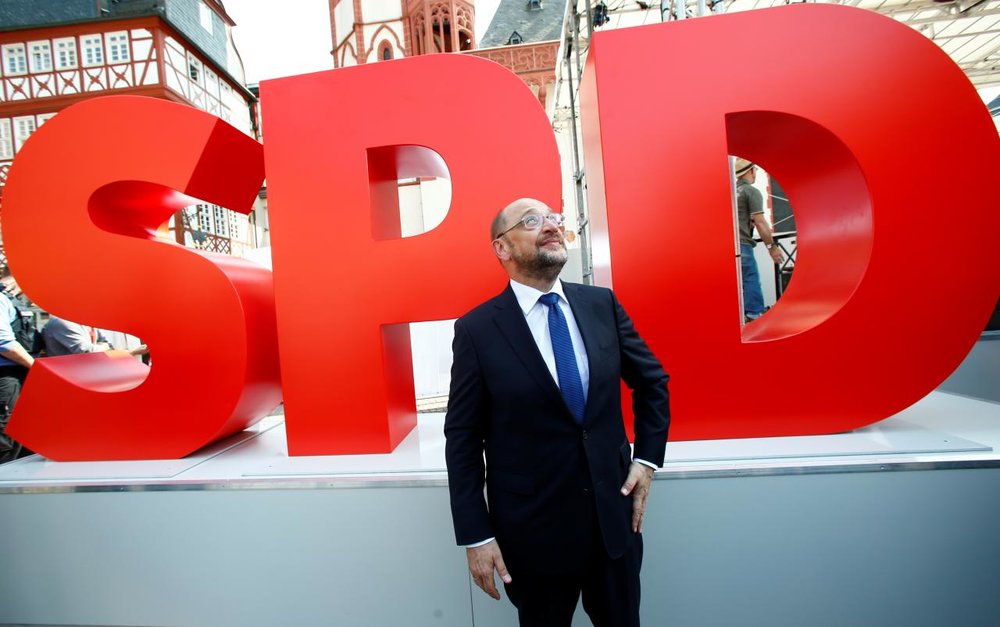Social Democrat Party Terms for Merkel

TEHRAN _ Merkel has still failed to form a coalition government in Germany. The Social-Democratic Party has laid the groundwork for a coalition government against the Christian Democrats. Certainly, Merkel can not fulfill most of these conditions. On the other hand, the disputes between the two traditional German parties remain strong on various issues of domestic politics and foreign policy.
While some experts and analysts from the German and European issues were optimistic about the negotiations between the two Christian and Social Democrats until recently, these days the probability of failure of talks between the two traditional German parties has once again grown. If the talks between the two Social Democrats and Christian Democrats fail, the elections will be held again in Germany.
An overview of what has happened in Germany over the past week is invaluable. As Reuters reported last week, Chancellor Angela Merkel on Saturday welcomed the prospect of talks on a “grand coalition” with her Social Democrat (SPD) rivals and defended the record of the previous such government, saying it had worked well.
Merkel’s fourth term was cast into doubt when the pro-business Free Democrats (FDP) walked out of three-way coalition talks with her conservative bloc and the Greens last Sunday, causing a political impasse in Europe’s biggest economy.
But on Friday, the SPD reversed a previous decision and agreed to talk to Merkel, raising the possibilities of a new “grand coalition” which has ruled Germany for the last four years, or of a minority government. Addressing party members on Saturday, Merkel argued voters had given her conservatives a mandate to rule in the Sept. 24 election which handed her party the most parliamentary seats but limited coalition options. Her conservatives bled support to the far-right Alternative for Germany (AfD).
“Europe needs a strong Germany, it is desirable to get a government in place quickly,” Merkel told a regional party meeting in northern Germany, adding, however, that her acting government could carry on day to day business. “Asking voters to go to the polls again would, I think be totally wrong,” she said. On Monday, Merkel had said she would prefer new elections to a minority government in which her party would be only held in power by others.
Without even mentioning the option of a minority government, Merkel said she wanted to look ahead after the setbacks of the last week. Sounding self-assured and drawing applause during her speech, she turned her attention fully to the SPD. Welcoming the prospect of talks with her former partner, she defended the record of the last coalition. “We worked well together,” she said, adding under the grand coalition, Germany enjoyed the strongest labor market for decades, a balanced budget and pensioners and families had benefited, she argued.
But in recent days, the probability of success of the Social Democratic and Christian Democrats talks in Germany has declined. Germany’s Social Democrat (SPD) Foreign Minister said on Thursday that his party would not be quick to agree to another grand coalition with Chancellor Angela Merkel’s conservatives, as party leaders met with the president in a bid to end political deadlock.
Merkel is casting around for a coalition partner after her center-right bloc shed support to the far right in a Sept. 24 election. Her attempts to form a three-way tie-up with the pro-business Free Democrats (FDP) and the Greens failed. The SPD, which saw its participation in a Merkel-led coalition government from 2013-17 rewarded with its worst election result in German post-war history, had been strongly opposed to another “grand coalition”.
But under pressure from Germany’s President Frank-Walter Steinmeier, SPD leader Martin Schulz has signaled willingness to discuss a way out of the political impasse.
SPD Foreign Minister Sigmar Gabriel told broadcaster ZDF no one should expect his party - still ruling with the conservatives in a caretaker government - to immediately agree to join another grand coalition now that talks to form a three-way ‘Jamaica’ alliance have failed.
“We’re now in a process orchestrated by the president, in which we first need to look at what the possibilities are but no one can expect it to go quickly,” he said, adding that it was up to the conservatives to show what they wanted. “The conservatives, Greens and FDP took months to get nothing off ground so I’d ask people not to put pressure on us,” Gabriel said, adding that the conservatives needed to make clear what they wanted.
Anyway, German Foreign Minister's remarks show that the Social Democrats do not intend to give a Christian Democrats a coalition government, while the Social Democratic Party plans to receive many concessions from Merkel. This has made it harder for the coalition government to be formed in Germany. Undoubtedly, the current political deadlock in Germany will continue. In addition, many analysts from the German issue believe that even if a coalition government is formed between the two Social Democratic and Christian Democrats, the severe disagreements between the two will prevent the government from succeeding.
